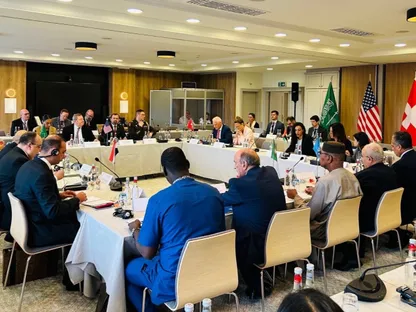How will Washington respond if the Sudanese government refuses the Geneva talks?

Sudan Events – Agencies
Observers expect that the United States, which has positioned itself as a mediator in resolving the Sudanese crisis, may impose sanctions on the government for not responding to the invitation extended to the head of the Sovereignty Council and Commander of the Sudanese Army, Abdel Fattah al-Burhan, to negotiate in Geneva.
At the end of July, the U.S. administration invited the parties involved in the Sudanese conflict to a new round of negotiations in Geneva to end the war that has been ongoing since April 15, 2023.
Sudan’s Foreign Minister Hussein Awad confirms the government’s commitment to the Jeddah Agreement (Sudanese Press)
Welcoming the Invitation
In his conversation with Al Jazeera Net, Sudanese Foreign Minister Hussein Awad said, “We have not outright rejected Washington’s invitation to discuss achieving a ceasefire, protecting civilians, and delivering aid.” He emphasized that they welcomed, in their response to the invitation, any effort that serves this purpose, provided that it falls within the framework of the Jeddah Declaration and does not reverse or “override what has already been achieved by creating a new platform.”
He added that they, therefore, insisted on the necessity of implementing what was agreed upon in Jeddah, which addresses the same issues currently being discussed. He affirmed that communication between the two countries on the matter has not stopped, with meetings taking place in Saudi Arabia, as well as phone communications.
Awad indicated that Cairo would host meetings between the Sudanese government and both mediators. He added, “Therefore, there is no justification for talking about sanctions from Washington or elsewhere. The government is most keen on protecting the interests of its people, and it is not driven by pressure or enticements if they conflict with what our people want.”
On Sunday, the Sudanese Sovereignty Council announced that it would send a delegation to the Egyptian capital to discuss the government’s vision for implementing the Jeddah Agreement, which obliges the Rapid Support Forces to vacate civilian homes and facilities, based on a request from the U.S. and Egyptian governments.
Last week, al-Burhan stated in a press briefing that the Sudanese government would not go to Geneva to discuss reaching a new agreement. He said, “If the United States is serious about peace efforts in Sudan, it should compel the Rapid Support Forces to implement the UN Security Council resolution to lift the siege of the city of El Fasher and stop the destruction of hospitals and the killing of civilians.”
Washington’s Reaction
Despite the “diplomatic” rejection of the U.S. invitation, political and journalistic circles in Sudan have not ruled out the possibility of Washington imposing sanctions on the Sudanese government for its refusal.
According to some, Washington has often used the “stick more than the carrot” in its previous mediations to resolve crises in South Sudan, Darfur, and the Nuba Mountains, resorting to numerous unilateral and direct sanctions or sanctions imposed through the Security Council.
Fears of Washington possibly imposing sanctions on the government were heightened by statements made by Mohamed Bashir Abu Namo, head of the Sudanese consultative delegation for the Jeddah talks that preceded the Geneva negotiations.
After returning from discussions with the U.S. side, Abu Namo said, “The U.S. delegation was implicitly threatening, and they came to Jeddah with a pre-prepared agenda without consulting us in the preparation and failed to provide a single reason for moving the negotiations to Geneva. They also failed to provide any guarantees for implementing the Jeddah forum’s decisions.”
A Sound Position
In his conversation with Al Jazeera Net, diplomatic expert Ambassador Ali Yusuf stated that the U.S. would not resort to the Security Council because it knows that the “Russian-Chinese veto stick is raised against it without hesitation.”
He considered the Sudanese leadership’s refusal to go to Geneva a sound and correct stance both in form and substance, as it was evident that the U.S. administration was attempting to impose a new reality that surpasses the outcomes of Jeddah and shifts the negotiations to a political horizon involving Sudanese forces seeking power.
According to Yusuf, the only thing that could impact the U.S. position is the strength of alliances with Russia and the shift eastward towards China, Malaysia, Vietnam, and Iran.
He pointed out that the result of the government’s refusal to go to Geneva was the failure of the attempt, forcing Washington to negotiate with the government today in Cairo under Egyptian auspices to discuss ways to implement the Jeddah Agreement and humanitarian aid delivery and how to get it to citizens quickly.
The diplomatic expert confirmed that the Sudanese government “will fight and negotiate as the militias did after the Jeddah Agreement, and it will achieve significant victories, after which a ceasefire agreement will be reached, and the final phase of stopping the war will begin,” as he put it.
Government statistics indicate that the losses from the war in Sudan over 16 months have exceeded $150 billion, while UN estimates suggest that the war has resulted in about 18,800 deaths and more than 10 million displaced and refugees inside and outside Sudan.



